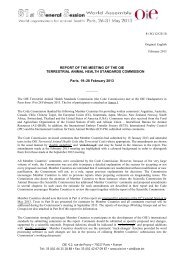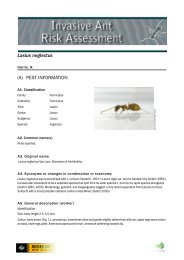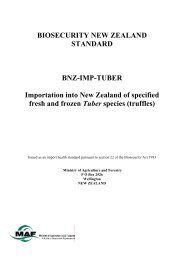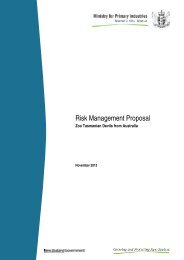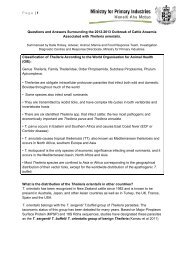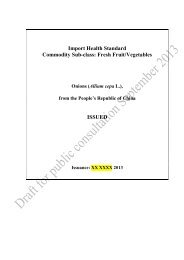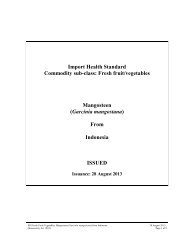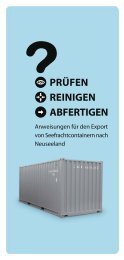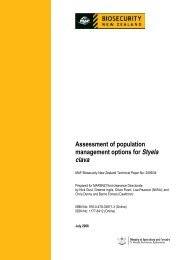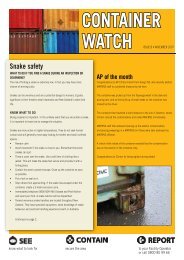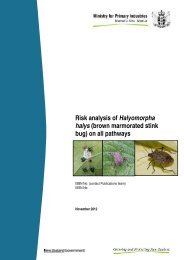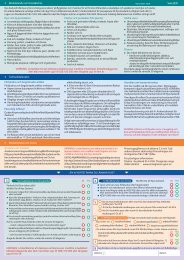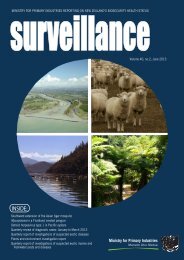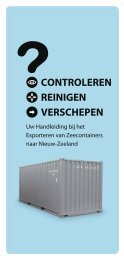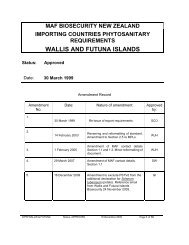Import risk analysis: Llamas (Lama glama) and alpacas (Vicugna ...
Import risk analysis: Llamas (Lama glama) and alpacas (Vicugna ...
Import risk analysis: Llamas (Lama glama) and alpacas (Vicugna ...
You also want an ePaper? Increase the reach of your titles
YUMPU automatically turns print PDFs into web optimized ePapers that Google loves.
25.3. RISK MANAGEMENT<br />
25.3.1. Options<br />
The following points were considered when drafting measures for the effective<br />
management of exotic Leptospira serovars in the commodity:<br />
� There are a very large number of pathogenic Leptospira serovars <strong>and</strong> the species in<br />
each country vary.<br />
� Vaccines that protect against all serovars are not available. There is little<br />
information on the efficacy of vaccines in camelids, <strong>and</strong> none are registered for use<br />
in this species. Vaccination is generally unreliable; to be effective it must take place<br />
before exposure <strong>and</strong> immunity must be maintained by repeated vaccination.<br />
Vaccination is effective only against those serovars included in the particular<br />
vaccine.<br />
� Leptospirosis is a rare disease of camelids, but subclinical infections may occur.<br />
� The length of time that camelids may remain carriers is not known, but<br />
extrapolation from other species suggests that it may be a protracted period should<br />
they be maintenance hosts for a particular serovar(s).<br />
� Isolation of organisms is a difficult <strong>and</strong> lengthy process taking up to 6 months <strong>and</strong><br />
not suitable as a diagnostic method for international trade of animals.<br />
� There are problems with the use of serological tests as a screening test particularly<br />
relating to serovar specificity. The MAT screening test for the importation of<br />
animals has limitations due to its poor sensitivity in both early <strong>and</strong> chronic<br />
infections, particularly if the relevant antigens are not represented <strong>and</strong> testing is<br />
carried out on a single sample. Serological screening for leptospirosis is of limited<br />
value because animals may be carriers without evidence of antibody production <strong>and</strong><br />
the detection of antibody does not indicate carrier status.<br />
� Antibiotic treatment has been used for many years as the sole method for<br />
management of the introduction of the organisms when importing animals.<br />
Antibiotic treatment is generally effective but cannot be guaranteed to clear<br />
leptospires from the kidneys in all cases.<br />
� Recently, at the OIE General Session in May 2009, the International Committee<br />
accepted the recommendation of the Terrestrial Animal Health St<strong>and</strong>ards<br />
Commission that the empty Code chapter on leptospirosis should be deleted from<br />
the Code. Leptospirosis still remains an OIE listed disease.<br />
� The rationale for deletion was cited in the March 2009 report of the Terrestrial<br />
Animal Health St<strong>and</strong>ards Commission:<br />
“Leptospirosis is distributed globally; it is improbable that any country can,<br />
with any credibility, claim to be free from the disease. Further, it is unlikely<br />
that any country has an official control programme for leptospirosis. Current<br />
serological tests <strong>and</strong> culture techniques are not able, with any degree of<br />
confidence, to demonstrate that an animal is free from leptospirosis. Antibiotic<br />
treatment to clear renal carriage of leptospires is not consistently successful<br />
<strong>and</strong> has not been validated in all the species subject to international trade.<br />
92 ● <strong>Import</strong> <strong>risk</strong> <strong>analysis</strong>: <strong>Llamas</strong> <strong>and</strong> <strong>alpacas</strong> from specified countries MAF Biosecurity New Zeal<strong>and</strong>



